海事VHF频率表
VHF国际海事对讲机频率详细划分

VHF国际海事对讲机频率详细划分
62
156.125
160.725
ቤተ መጻሕፍቲ ባይዱ02
02
156.100
160.700
62A
156.125
156.125
03
03
156.150
160.750
63
156.175
160.775
03A
156.150
156.150
63A
156.175
156.175
04
156.200
160.800
64
64
156.225
160.825
船用对讲机是专业性特别强的对讲机,其使用环境恶劣,船舶活动范围广阔,海上温度变化又大,要适应全球海上安全航行的需要,其产品设计是十分专业的,工作频率也是统一的按照国际海事通信的统一规定海上船用对讲机贩工作频率范围TX从 156.025MHz-157.425MHz,RX从156.050MHz-163.275MHz。工作频道又分为国际频道、美国频道和加拿大频道,还有10个气象频道(其中8个是美国气象频道, 2 个是加拿大气象频道)。三种工作频道也就是三个频道标准版本,种种船用对讲机都有三种标准版本。用户根据使用要求,在选购船用对讲机的同时也选用不同版本的频率。采用美国频率标准版本的国家较多,我国船用对讲机大多采用美国版本,据说可能是美国频率版本的同频点较多,异频点较少。
海事vhf技术参数
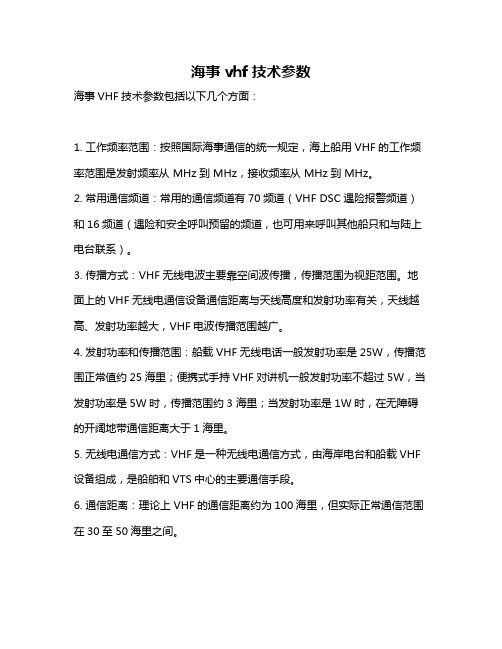
海事vhf技术参数
海事VHF技术参数包括以下几个方面:
1. 工作频率范围:按照国际海事通信的统一规定,海上船用VHF的工作频率范围是发射频率从 MHz到 MHz,接收频率从 MHz到 MHz。
2. 常用通信频道:常用的通信频道有70频道(VHF DSC遇险报警频道)和16频道(遇险和安全呼叫预留的频道,也可用来呼叫其他船只和与陆上电台联系)。
3. 传播方式:VHF无线电波主要靠空间波传播,传播范围为视距范围。
地面上的VHF无线电通信设备通信距离与天线高度和发射功率有关,天线越高、发射功率越大,VHF电波传播范围越广。
4. 发射功率和传播范围:船载VHF无线电话一般发射功率是25W,传播范围正常值约25海里;便携式手持VHF对讲机一般发射功率不超过5W,当发射功率是5W时,传播范围约3 海里;当发射功率是1W时,在无障碍的开阔地带通信距离大于1海里。
5. 无线电通信方式:VHF是一种无线电通信方式,由海岸电台和船载VHF 设备组成,是船舶和VTS中心的主要通信手段。
6. 通信距离:理论上VHF的通信距离约为100海里,但实际正常通信范围在30至50海里之间。
需要注意的是,由于船舶活动范围特别广阔,使用环境比较恶劣,海上温度、湿度变化较大,船用无线电话的专业性特别强,要适应全球海上安全航行的需要,工作频率也是全球统一的。
根据SOLAS公约第Ⅳ章的规定,所有客
船和300总吨及以上的货船,应设有一台VHF无线电话设备。
同时,中华
人民共和国船舶检验局船规字[1998]446号规定:20 m及以上的非国际航
行海船,应设有一台VHF无线电话设备。
VHF海事电台频率

156.0
50156.0
.1
00160.70062A
156.1
50160.7
.1
50156.15063A
156.2
00160.8
.2
00156.20064A
156.2
50160.8
.2
50156.25065A65A
156.3
00156.3
.3
50160.95066A66A*
156.3
25156.2
25156.2
75160.8
75156.2
75156.2
75156.3
25160.9
25156.3
25156.3
25156.3
75156.3
75156.4
25156.4
25156.4
75156.475Rx only
156.5
25156.5
75156.5
75156.6
25156.6
25156.6
50156.35067*
67156.4
00156.4
6.4
50156.4
6.5
00156.5
6.5
50156.5
6.6
00156.6
6.6
50156.6
6.7
00156.7
6.7
50156.75077*77*
156.8
00156.8
.8
50156.85078A
156.9
00161.5
.9
00156.90079A
157.3
00161.9
7.3
50161.95086A
157.4
单边带频率表
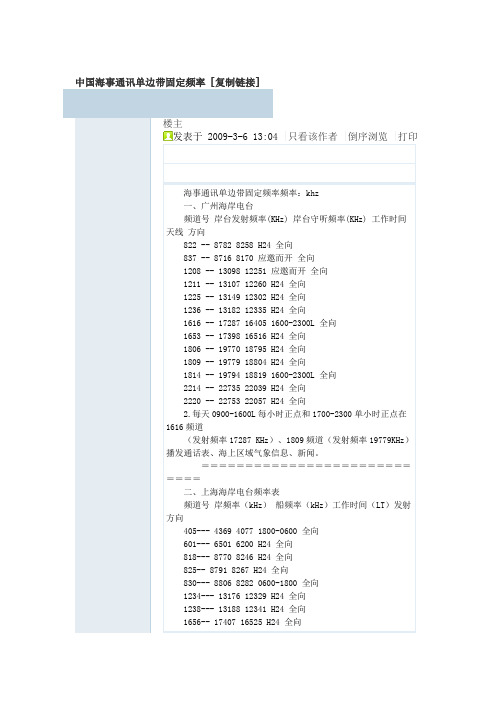
发表于2,639.4 KHz—————————————————————————————————济州海洋警察署,3404(济州海警) F1B 4,177.5 KHz F1B 4,212.5/4,174.5 KHz(Jeju Coast Guard, Korea)--------------F3E 156.800 MHz F3E 156.450 MHz---------------------------------------H(J)3E 2,182 KHz J3E 2,110,2,639.4 KHz***************************************************************无线通信网(VHF海岸局):---救助分部(RSC) 呼叫名称 / 呼叫用周波数 / 通信用周波数束草海洋警察署(Sokcho Coast Guard, Korea)---束草海警(Sokcho Maritime Police radio) F3E 156.800MHz---F3E 156.450MHz泰安海洋警察署(Taean Coast Guard, Korea)---泰安海警(Taean Maritime Police radio) F3E 156.800MHz----F3E 156.450MHz 群山海洋警察署(Gunsan Coast Guard, Korea)---群山海警(Gunsan Maritime Police radio) F3E 156.800MHz---F3E 156.450MHz丽水海洋警察署(Yeosu Coast Guard, Korea)---丽水海警(Yeosu Maritime Police radio) F3E 156.800MHz---F3E 156.450MHz 莞岛海洋警察署(Wando Coast Guard, Korea)---莞岛海警(Wando Maritime Police radio) F3E 156.800MHz----F3E 156.450MHz浦项海洋警察署(Pohang Coast Guard, Korea)---浦项海警(Pohang Maritime Police radio) F3E 156.800MHz---F3E 156.450MHz蔚山海洋警察署(Ulsan Coast Guard, Korea)---蔚山海警(Ulsan Maritime Police radio) F3E 156.800MHz----F3E 156.450MHz 统营海洋警察署(Tongyeong Coast Guard, Korea)---统营海警(Tongyeong Maritime Police radio) F3E 156.800MHz F3E156.450MHz——————————————————————————————---公用通信(电话、FAX、直通电报):官署名/ 海上治安综合/ 地址邮编号码/ 状况室-电话- / FAX- / 直通电报海洋警察厅 032)883-0461 032)881-9595 K24920 仁川市中区北城洞1街 105 400-707釜山海警署 051)404-6112 ------------ K53343 釜山市影岛区东三洞 254-10 606-080仁川海警署 032)888-0112 032)883-9595 K35522 仁川市中区北城洞1街 103400-201束草海警署 033)632-0112 033)635-0112 ------ 束草市东明洞 53-3 217-020 东海海警署 033)532-7072 033)531-9595 K35521 东海市泉谷洞 820 240-010 泰安海警署 041)675-0112 041)675-7525 ------ 忠南泰安郡泰安邑长山里124 357-907群山海警署 063)467-5472 063)467-2104 ------ 群山市小龙洞 9-9 573-400 木浦海警署 061)242-0112 061)243-9595 K67116 木浦市山亭洞 1527 530-350 莞岛海警署 061)554-0112 061)555-5060 ------ 莞岛郡莞岛邑中道里 760-1 537-805丽水海警署 061)651-0112 061)651-6380 ------ 丽水市文水洞 111 550-200 浦项海警署 054)242-0112 054)243-4997 ------ 浦项市北区龙兴洞101-4 791-809蔚山海警署 052)260-0112 052)257-4192 ------ 蔚山市南区梅岩洞 139-26 680-050统营海警署 055)641-4112 055)648-6112 ------ 统营市凤坪洞 13-9 650-140 济州海警署 064)751-0112 064)756-9595 K67117 济州市健入洞 987-1690-050。
关于上海内河船舶配置甚高频电台(VHF)的公告

关于上海内河船舶配置甚高频电台(VHF)的公告依照中华人民共和国交通运输部《关于上海世博会船舶配备保安设施的公告》(2009年第33号)的要求,从2010年1月1日起所有进入上海内河水域的货船必须安装甚高频电台(VHF),现将有关要求公告如下:一、技术标准。
为保障水上交通安全和良好的无线电通信环境,依据中华人民共和国海事局《船舶与海上设施法定检验规则内河船舶法定检验技术规则》,对内河船舶甚高频(VHF)电台的要求如下:1、船舶配备的船用VHF电台必须是经国家船舶检验机构检验合格的船舶专用无线电台,且具有国家无线电主管机关许可在我国境内使用的证书;2、船舶配备使用VHF电台的需向国家无线电管理机构申请办理船舶无线电台执照;3、船舶配备无线电设备的配备定额见附件一;4、电台的发射功率不得大于25W,且在近距离通讯时能够调节到1W;5、船舶电台发射频率156.025~157.425MHz,接收频率156.050~162.025MHz;6、船舶电台的频道应为水上专用频道,在设备上可显示,共划分了57个信道,其中单工信道20个,双工信道35个,DSC专用信道2个;7、电台应至少能够在06和16(156.800MHz)频道分别用于船舶遇险呼叫和安全避让的协调通讯,16和70频道的选择和使用应有独立专用按键,并与其它键用不同的颜色表示出来。
二、设备安装。
设备的安装维护由用户直接与供应商联络。
为打击假冒和劣质船舶电台,维护水上交通安全,我局面向社会公开征集合法诚信的船舶无线电台经销商。
1、企业须取得我国工商管理机关许可的在我国市场合法销售的证明文件,注册资金100万元以上且具有一定规模;2、企业应具有水上无线电台设备的授权经营资格,并保证售出的船舶电台为正规厂商生产;3、企业须承诺对售出的产品提供完善的安装、维修等售后服务;4、为方便用户在航行途中就近安装不影响经营,我局自2009年12月1日起在部分海事站点设点接纳企业技术人员入驻(入驻的海事站点及联系方式见附件二);5、在指定站点安装VHF电台的,随设备配发船舶无线电台执照。
沿海各港高频频道一览表

沿海各港⾼频频道⼀览表VHF频道⼀览表渤海湾1.鲅鱼圈:VTS 69频道,台⼦⼭20海⾥报告线道。
港调:08 频道申请离泊、进港计划码头公司调度:08 频道(在进港前呼叫码头调度安排派解缆⼯⼈)2.营⼝港:3.锦州港:动态06频道报告港监,。
港调09频道现港外主航道已经全⾯拓展为25万吨级航道。
4.葫芦岛:海事135.秦皇岛: VTS:08频道,报告线是以南⼭灯塔为中⼼15海⾥的范围,锚泊后报告锚位也是报告南⼭灯塔的范围距离。
芝海代理:⼯作频道13,呼叫频道14,港内⼀切船舶都是芝海代理调动,和通知动态。
引⽔和港调8公司调度均是14频道呼叫。
6.京唐港:海事:CH09 ,申请锚位和抛好锚后必须报交管(但是有时候港调会通知你不⽤报告了由它转告就⾏了。
)港调CH 17,抵锚地抛锚后锚位报海事:锚位到京唐灯桩的⽅位距离。
有时港调能给你转告海事你的报告。
7.天津港:天津港VTS 09,锚地抛好锚后,应将锚位距离⼤沽⼝灯桩的⽅位距离报告给交管中⼼。
申请起锚上线、下线、靠妥泊位、申请离泊位都得向交管中⼼申请。
进⼝船舶在过了⼤沽灯桩前,未同意进⼊航道的船舶可以在航道北边等候或慢车,(铭扬洲99⼀般都是在21号浮上线)直⾄申请同意后才可以进⼊航道上,进⼊航道时应⽴即报告海事。
轮调13CH8.黄骅港: VTS 08频道,以北纬38°20.4′东经117°55.35′为中⼼半径28海⾥所覆盖的范围为报告线,抛锚时好像并不需要⾮得抛在锚地⾥不可,抛好后报告交管中⼼,报港调,报船代、就⾏了。
港调 13频道,船代 73频道。
9.莱州港:10.龙⼝港:龙⼝话台CH 16, 港调CH 77,港调通知进港后,可以跟交管中⼼申请进港,港⼝规定:船长超过120⽶的船舶,应强制拖轮、引⽔。
1.蓬莱港:西来船舶经过长⼭⽔道欲去蓬莱的话,出东⼝后可以询问长⼭交管中⼼是否可以提前转向来到锚地,如果同意后可进⾏。
2.烟台港:VTS09频道港内06频道3.威海港:海事164.⼤连港:整个⼤连港内港区是⽤06频道。
VHF水上移动频段内的发射频率表-ITU

Place des NationsTelephone +41 22 730 51 11 Telex 421 000 uit chE-mail: itumail@itu.int CH-1211 Geneva 20 Telefax Gr3: +41 22 733 72 56 Telegram ITU GENEVE http://www.itu.int/ Switzerland Gr4: +41 22 730 65 00无线电通信局(传真:+41 22 730 57 85)通函 CM/192009年3月27日致国际电联成员国主管部门事由: 无线电规则委员会批准的《程序规则》参考文件: 《无线电规则》附录18 致总局长尊敬的先生/女士:1 根据《无线电规则》第13.12和第13.14款的规定,无线电规则委员会(RRB )在其第49次会议(2008年12月1-5日)上批准了若干新的或经修改的《程序规则》。
2 本文附件附有关于VHF 海事移动频段发射频率表的《无线电规则》附录18(WRC-07,修订版)的新《程序规则》。
3 如果主管部门需就此问题提供必要的补充信息与说明,无线电通信局随时听候调遣。
无线电通信局主任 瓦列里·吉莫弗耶夫附件: 关于《无线电规则》附录18的规则(包括在《程序规则》(2009年版)中)分发:– 国际电联成员国主管部门 – 国际海事组织(IMO ) –国际航标协会(IALA )国 际 电 信 联 盟附件有关《无线电规则》附录18的规则WRC-07修订了附录18,变更了附录18(WRC-07,修订版)所列数个频道的适用范围。
01、07、19、20、21、60、66、78、79、80和81频道做了如此修订,在这些频道旁标记了特别注释“m”,即“这些频道可以作为单频频道来操作,但应与受影响的主管部门协调”。
在附录18发射频率表特定频道旁标记注释“m”的目的通常与“单频”栏中的“x”符号有关。
海事VHF频率表之欧阳家百创编

(This chart is also available in text or Excel versions)VHF Maritime Spectrum ChartNOAA Weather Radio FrequenciesSee the NOAA Weather Radio Homepage for more information. Additional Information, Frequencies, & ChartsFrequencies are in MHz. Modulation is 16KF3E or 16KG3E.Note that the letter "A" indicates simplex use of the ship station transmit side of an international duplex channel, and that operations are different than international operations on that channel. Some VHF transceivers are equipped with an "International - U.S." switch for that purpose. "A" channels are generally only used in the United States, and use is normally not recognized or allowed outside the U.S. The letter "B" indicates simplex use of the coast station transmit side of an international duplex channel. The U.S. does not currently use "B" channels for simplex communications in this band.Boaters should normally use channels listed as Non-Commercial. Channel 16 is used for calling other stations or for distress alerting. Channel 13 should be used to contact a ship when there is danger of collision. All ships of length 20m or greater are required to guard VHF channel 13, in addition to VHF channel 16, when operating within U.S. territorial waters. Users may be fined by the FCC for improper use of these channels. See Marine Radio Watch Requirements for further information.See the Federal Communications Commission's Marine VHF Radio Channels page. The FCC page does not include frequency information, but has more complete information on the use of the channels. If younotice any discrepancy between these two lists, please notify us at cgcomms@.Also available are International VHF Maritime Radio Channels and Frequencies, Narrowband VHF Maritime Channels and Frequencies, Radio Information for Boaters , and U.S. Coast Guard VHF Distress and Safety Coverage。
VHF设备主要通信功能(海上)

甚高频(VHF)无线电通信设备是实现水上近距离无线电通信的主要设备,通信距离大约20海里左右,工作频段为156~174MHz。
根据1988年SOLAS公约修正案要求,具有无线电话和数字选择性呼叫(DSC)通信功能的甚高频(VHF)无线电通信设备是海上船舶的基本配备设备之一。
VHF无线电通信设备主要通信功能是能够实现船到岸、岸到船的无线电话通信和DSC呼叫。
VHF 无线电话通信功能(1) 港口引航业务、船舶动态业务通信。
(2) 公众通信。
在A1海区船舶能通过该海区的VHF海岸电台和陆上电话网用户进行通信。
(3) 驾驶台对驾驶台通信。
实现船舶操作、安全避让、船舶移动等通信。
(4) 近距离搜救协调通信,搜救现场通信。
海上VHF通信波段CH16信道是无线电话遇险和安全频率。
(5)VHF CH16信道的值守。
VHF 数字选择性呼叫功能VHF波段DSC的专用信道为VHF CH70信道,主要实现如下功能:(1)遇险报警、遇险收妥、遇险转发。
航行在A1、A2、A3、A4任何海区的船舶,可使用VHF DSC方式可以实现近距离的船到船的遇险报警,遇险收妥以及遇险转发。
如果船舶航行于A1海区,VHF DSC可以实现船到岸DSC遇险呼叫;也可以实现岸到船方向的遇险收妥和遇险转发。
(2)紧急呼叫。
当船舶遇到紧急情况,比如人员落水、船员严重疾病等情况,需要附近其它船舶的紧急帮助或者采取紧急措施,可以在VHF CH70信道上发送一个紧急优先等级的DSC呼叫,再转到约定的信道(非遇险情况下一般使用VHF CH16信道)上进行紧急无线电话通信。
(3)安全呼叫。
当船舶遇到一些影响航行安全的情况,比如航线上发现水上漂流物,需要告知其它船舶,可以在VHF CH70信道上发送一个安全优先等级的DSC 呼叫,再转到约定的信道上进行无线电话安全通信。
(4)常规呼叫。
为了和陆上VHF岸台(A1海区时)或者和附近船舶进行日常VHF 无线电话通信,可以先在VHF CH70信道上发送一个日常优先等级的DSC呼叫,再转到约定的信道上进行无线电话通信。
海事VHF频率表

(This chart is also available in text or Excel versions)VHF Maritime Spectrum ChartNOAA Weather Radio FrequenciesSee the NOAA Weather Radio Homepage for more information.Additional Information, Frequencies, & ChartsFrequencies are in MHz. Modulation is 16KF3E or 16KG3E.Note that the letter "A" indicates simplex use of the ship station transmit side of an international duplex channel, and that operations are different than international operations on that channel. Some VHF transceivers are equipped with an "International - U.S." switch for that purpose. "A" channels are generally only used in the United States, and use is normally not recognized or allowed outside the U.S. The letter "B" indicates simplex use of the coast station transmit side of an international duplex channel. The U.S. does not currently use "B" channels for simplex communications in this band.Boaters should normally use channels listed as Non-Commercial. Channel 16 is used for calling other stations or for distress alerting. Channel 13 should be used to contact a ship when there is danger of collision. All ships of length 20m or greater are required to guard VHF channel 13, in addition to VHF channel 16, when operating within U.S. territorial waters. Users may be fined by the FCC for improper use of these channels. See Marine Radio Watch Requirements for further information.See the Federal Communications Commission's Marine VHF Radio Channels page. The FCC page does not include frequency information, but has more complete information on the use of the channels. If you notice anydiscrepancy between these two lists, please notify us at****************.Also available are International VHF Maritime Radio Channels and Frequencies, Narrowband VHF Maritime Channels and Frequencies, Radio Information for Boaters , and U.S. Coast Guard VHF Distress and Safety Coverage。
沿海港VHF表

海事
9
话台
16
可转港调船调等
北海港调 14
引航站 海事、交管
港调 话台 引航站
8 9 11 16 9
海事(八所) 12
烟台山灯塔15海里
南海及其 八所港调
他
海口调度引水
深沪港调
8 14 8
三亚海事 14
琼州海峡 08,成山头 08,长山水
道08
VTS报告
8
大小公岛连线
三亚港调
8
港调
11
南通交管 69
莱州 乍浦
海事 港调 港调
9 13 8
上海
黄浦江
宝山以西27,宝 山港区13
19、06
乍浦
交管
11
大连
天津 曹妃甸
秦皇岛
营口
锦州 京唐 丹东 龙口 烟台 威海 青岛 日照 岚山 连云港 上海
中国沿海港口VHF频道一览表
大连话台 16、13 大窑湾引航站 65(A)
黄骅
VTS报告 海事
8
南防波堤灯28海 里
16
大连轮驳公司 17
洋山
交管
13
大连引航站
12
大窑大湾连及港附调近水 大连湾域及附近
13 8 6
老铁山
10
大三山岛12海里 大三山岛12海里 老铁山灯桩20海里
宁波 福州
交管 港调、海 马尾港调
话台 调度
06、08 09、13
13 12 10
一区06,二区08
闽江口1#浮 报活台
进出大港平H0灯船报VTS
交管
8
话台
16
可转引航港调船调
厦门
话台
16
上海海事局关于调整辖区甚高频无线电话频道使用范围的通知

上海海事局关于调整辖区甚高频无线电话频道使用范围的通知文章属性•【制定机关】•【公布日期】2019.11.08•【字号】沪海指挥〔2019〕303号•【施行日期】2020.01.01•【效力等级】地方规范性文件•【时效性】现行有效•【主题分类】通信业正文上海海事局关于调整辖区甚高频无线电话频道使用范围的通知沪海指挥〔2019〕303号2020年1月1日文件解读:https:///zcjd/75367.jhtml各相关单位:为提高辖区甚高频无线电话(以下简称VHF)通信质量和通讯效率,维护通航秩序,保障人命财产安全,现调整上海海事局辖区VHF频道使用范围如下:一、公共安全通信频道横沙雷达站经度线(121°51?E)以西长江上海段水域、北港水域和北支水域,以及黄浦江干线水域内公共安全通信频道为CH06频道。
横沙雷达站经度线(121°51?E)以东长江上海段水域、北港水域和北支水域、长江口船舶定线制及附近海区等水域内公共安全通信频道为CH16频道。
二、上海海事局各单位通信频道吴淞海事局:CH13频道。
杨浦海事局:CH08频道,CH14频道备用。
黄浦海事局:CH08频道。
闵行海事局:CH13频道。
宝山海事局:CH13频道。
浦东海事局:CH67频道。
崇明海事局:CH14频道(覆盖崇明、长兴、横沙及北港水域);CH13频道(覆盖北支水域)。
洋山港海事局:CH73频道。
金山海事局:CH08频道,CH11频道备用。
东海海巡执法总队:CH67频道。
三、吴淞VTS工作频道长江口水域:CH08频道,CH65频道(双工)备用。
长江口深水航道及附近水域:CH09频道,CH26频道(双工)备用。
南槽航道及附近水域:CH72频道,CH26频道(双工)备用。
吴淞口、外高桥及相关锚地水域:CH71频道,CH61频道(双工)备用。
宝山航段及附近水域:CH73频道,CH27频道(双工)备用。
吴淞VTS黄浦江水域:CH11频道,CH19频道(双工)备用。
海事VHF频率表之欧阳术创编

(This chart is also available in text or Excel versions)VHF Maritime Spectrum ChartNOAA Weather Radio FrequenciesSee the NOAA Weather Radio Homepage for more information. Additional Information, Frequencies, & ChartsFrequencies are in MHz. Modulation is 16KF3E or 16KG3E.Note that the letter "A" indicates simplex use of the ship station transmit side of an international duplex channel, and that operations are different than international operations on that channel. Some VHF transceivers are equipped with an "International - U.S." switch for that purpose. "A" channels are generally only used in the United States, and use is normally not recognized or allowed outside the U.S. The letter "B" indicates simplex use of the coast station transmit side of an international duplex channel. The U.S. does not currently use "B" channels for simplex communications in this band. Boaters should normally use channels listed as Non-Commercial. Channel 16 is used for calling other stations or for distress alerting. Channel 13 should be used to contact a ship when there is danger of collision. All ships of length 20m or greater are required to guardVHF channel 13, in addition to VHF channel 16, when operating within U.S. territorial waters. Users may be fined by the FCC for improper use of these channels. See Marine Radio Watch Requirements for further information.See the Federal Communications Commission's Marine VHF Radio Channels page. The FCC page does not include frequency information, but has more complete information on the use of the channels. If you notice any discrepancy between these two lists, please notify us at cgcomms@.Also available are International VHF Maritime Radio Channels and Frequencies, Narrowband VHF Maritime Channels and Frequencies, Radio Information for Boaters , and U.S. Coast Guard VHF Distress and Safety Coverage。
关于上海内河船舶配置甚高频电台(VHF)的公告

关于上海内河船舶配置甚高频电台(VHF)的公告依照中华人民共和国交通运输部《关于上海世博会船舶配备保安设施的公告》(2009年第33号)的要求,从2010年1月1日起所有进入上海内河水域的货船必须安装甚高频电台(VHF),现将有关要求公告如下:一、技术标准。
为保障水上交通安全和良好的无线电通信环境,依据中华人民共和国海事局《船舶与海上设施法定检验规则内河船舶法定检验技术规则》,对内河船舶甚高频(VHF)电台的要求如下:1、船舶配备的船用VHF电台必须是经国家船舶检验机构检验合格的船舶专用无线电台,且具有国家无线电主管机关许可在我国境内使用的证书;2、船舶配备使用VHF电台的需向国家无线电管理机构申请办理船舶无线电台执照;3、船舶配备无线电设备的配备定额见附件一;4、电台的发射功率不得大于25W,且在近距离通讯时能够调节到1W;5、船舶电台发射频率156.025~157.425MHz,接收频率156.050~162.025MHz;6、船舶电台的频道应为水上专用频道,在设备上可显示,共划分了57个信道,其中单工信道20个,双工信道35个,DSC专用信道2个;7、电台应至少能够在06和16(156.800MHz)频道分别用于船舶遇险呼叫和安全避让的协调通讯,16和70频道的选择和使用应有独立专用按键,并与其它键用不同的颜色表示出来。
二、设备安装。
设备的安装维护由用户直接与供应商联络。
为打击假冒和劣质船舶电台,维护水上交通安全,我局面向社会公开征集合法诚信的船舶无线电台经销商。
1、企业须取得我国工商管理机关许可的在我国市场合法销售的证明文件,注册资金100万元以上且具有一定规模;2、企业应具有水上无线电台设备的授权经营资格,并保证售出的船舶电台为正规厂商生产;3、企业须承诺对售出的产品提供完善的安装、维修等售后服务;4、为方便用户在航行途中就近安装不影响经营,我局自2009年12月1日起在部分海事站点设点接纳企业技术人员入驻(入驻的海事站点及联系方式见附件二);5、在指定站点安装VHF电台的,随设备配发船舶无线电台执照。
航空海事频率
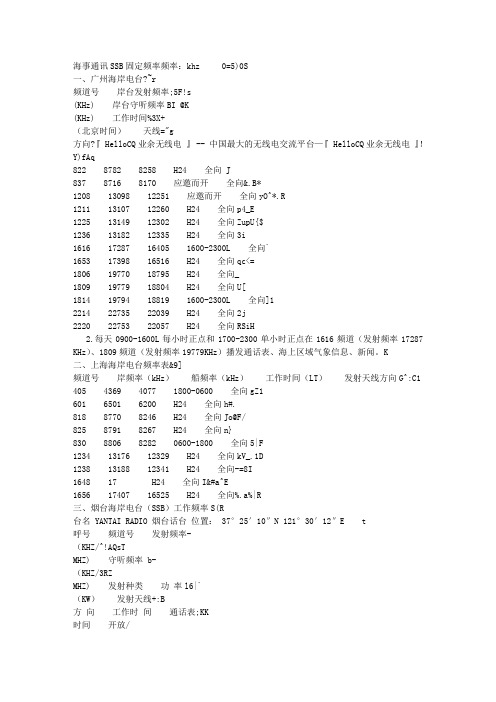
海事通讯SSB固定频率频率:khz 0=5)0S一、广州海岸电台?~r频道号岸台发射频率;5F!s(KHz) 岸台守听频率BI @K(KHz) 工作时间%3X+(北京时间)天线="g方向?『 HelloCQ业余无线电』 -- 中国最大的无线电交流平台—『 HelloCQ业余无线电』!Y)fAq822 8782 8258 H24 全向 J837 8716 8170 应邀而开全向&.B*1208 13098 12251 应邀而开全向yO^*.R1211 13107 12260 H24 全向p4_E1225 13149 12302 H24 全向ZupU{$1236 13182 12335 H24 全向3i1616 17287 16405 1600-2300L 全向`1653 17398 16516 H24 全向qc<=1806 19770 18795 H24 全向_1809 19779 18804 H24 全向U[1814 19794 18819 1600-2300L 全向]12214 22735 22039 H24 全向2j2220 22753 22057 H24 全向RSiH2.每天0900-1600L每小时正点和1700-2300单小时正点在1616频道(发射频率17287 KHz)、1809频道(发射频率19779KHz)播发通话表、海上区域气象信息、新闻。
K二、上海海岸电台频率表&9]频道号岸频率(kHz)船频率(kHz)工作时间(LT)发射天线方向G^:C1 405 4369 4077 1800-0600 全向gZ1601 6501 6200 H24 全向h#.818 8770 8246 H24 全向Jo@F/825 8791 8267 H24 全向n}830 8806 8282 0600-1800 全向5|F1234 13176 12329 H24 全向kV_.1D1238 13188 12341 H24 全向-=8I1648 17 H24 全向I&#a^E1656 17407 16525 H24 全向%.a%|R三、烟台海岸电台(SSB)工作频率S(R台名 YANTAI RADIO 烟台话台位置: 37°25′10″N 121°30′12″E t呼号频道号发射频率-(KHZ/^!AQsTMHZ) 守听频率 b-(KHZ/3RZMHZ) 发射种类功率l6|`(KW)发射天线+:B方向工作时间通话表;KK时间开放/业务?『 HelloCQ业余无线电』 -- 中国最大的无线电交流平台—『 HelloCQ业余无线电』!5xG烟台话台+~(6&YANTAIg$.txRADIO 2182、2627 2182 H3E,OJ3E 1 全向 0000—2400 |C409 4381 4089 J3E 全向 0000—2400>&@<?『 HelloCQ业余无线电』 -- 中国最大的无线电交流平台—『 HelloCQ业余无线电』!2?oK?『 HelloCQ业余无线电』 -- 中国最大的无线电交流平台—『 HelloCQ业余无线电』!("每双小时O6&30分 CR!57"m?C816 8764 8240 J3E 0.5 全向 0$JJ XC1201 13077 12230 J3E 全向 tiC1631 17332 16450 J3E 全向 B:h;:9?『 HelloCQ业余无线电』 -- 中国最大的无线电交流平台—『 HelloCQ业余无线电』!LW四、青岛海岸台K频道号 2182KHZ 2182KHZ J3E H3E 0000-2400 遇险lV>单边带无线电话SSB CH410 4384KHZ 4092KHZ J3E 常规ht-h!nCH826 8794KHZ 8270KHZ I0,4CH1211 13107KHZ 12260KHZ +!'f?『 HelloCQ业余无线电』 -- 中国最大的无线电交流平台—『 HelloCQ业余无线电』!W 五、海南八所海岸电台&meaBASUO RADIO 八所台pb呼号工作频率=O~mM(KHZ)守听频率0)F(KHZ/MHZ)发射种类工作时间通话表on八所台XSH 2182、2605 2182 A3E 0000-2400 单时xdzl25分?『 HelloCQ业余无线电』 -- 中国最大的无线电交流平台—『 HelloCQ业余无线电』!]C00412 3600 2182 2187.5 J3E ~>9海口岸台pIIN(1)无线电话SSB:P3Uu#频道发射频率MHz 守听频率MHz 开放时间-HS+]/816 8764 8240 H24qlD608 6522 6221 H24T/|}Wf419 4411 4119 1800--0600't!`=)bU(4)无线电话遇险值守频率:2182KHZ\?『 HelloCQ业余无线电』 -- 中国最大的无线电交流平台—『 HelloCQ业余无线电』!)六、厦门海岸台: p&台名XIAMENRADIO 6呼号工作频率工作时间通报表时间{`fXSM4420000~2400每奇数小时第10分钟a!A|"43141800~0600 ua84530000~2400 ;128760600~1800 >Z*.七、大连海岸电台:(SSB)8716千赫兹频率上,"气象报告:9时20分、18时20分;气象警告:12时20分、15时20分、22时20分。
海事VHF频率表之欧阳体创编
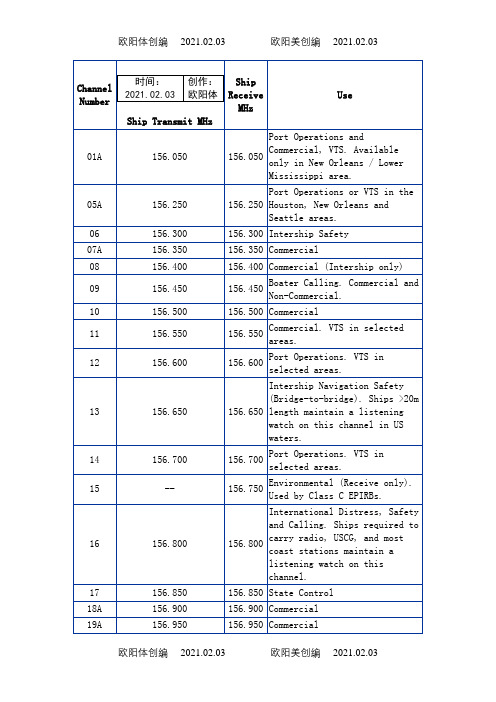
(This chart is also available in text or Excel versions)VHF Maritime Spectrum ChartNOAA Weather Radio FrequenciesSee the NOAA Weather Radio Homepage for more information. Additional Information, Frequencies, & ChartsFrequencies are in MHz. Modulation is 16KF3E or 16KG3E.Note that the letter "A" indicates simplex use of the ship station transmit side of an international duplex channel, and that operations are different than international operations on that channel. Some VHF transceivers are equipped with an "International - U.S." switch for that purpose. "A" channels are generally only used in the United States, and use is normally not recognized or allowed outside the U.S. The letter "B" indicates simplex use of the coast station transmit side of an international duplex channel. The U.S. does not currently use "B" channels for simplex communications in this band. Boaters should normally use channels listed as Non-Commercial. Channel 16 is used for calling other stations or for distress alerting. Channel 13 should be used to contact a ship when there is danger of collision. All ships of length 20m or greater are required to guard VHF channel 13, in addition to VHF channel 16, when operatingwithin U.S. territorial waters. Users may be fined by the FCC for improper use of these channels. See Marine Radio Watch Requirements for further information.See the Federal Communications Commission's Marine VHF Radio Channels page. The FCC page does not include frequency information, but has more complete information on the use of the channels. If you notice any discrepancy between these two lists, please notify us at cgcomms@.Also available are International VHF Maritime Radio Channels and Frequencies, Narrowband VHF Maritime Channels and Frequencies, Radio Information for Boaters , and U.S. Coast Guard VHF Distress and Safety Coverage。
海事VHF频率表之欧阳引擎创编
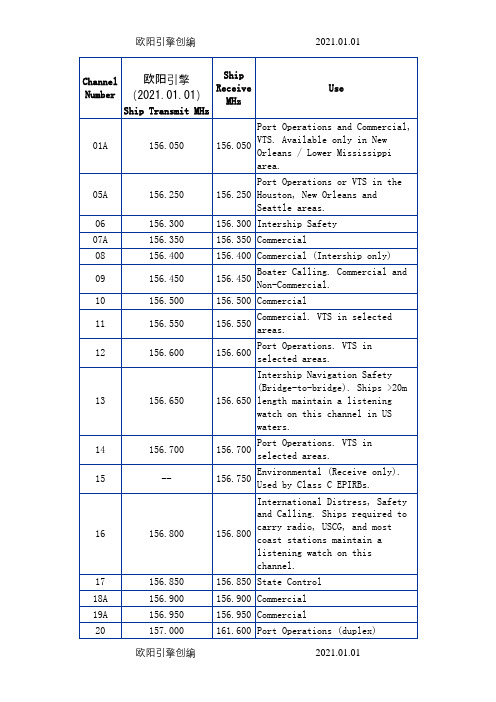
(This chart is also available in text or Excel versions)VHF Maritime Spectrum ChartNOAA Weather Radio FrequenciesSee the NOAA Weather Radio Homepage for more information. Additional Information, Frequencies, & ChartsFrequencies are in MHz. Modulation is 16KF3E or 16KG3E.Note that the letter "A" indicates simplex use of the ship station transmit side of an international duplex channel, and that operations are different than international operations on that channel. Some VHF transceivers are equipped with an "International - U.S." switch for that purpose. "A" channels are generally only used in the United States, and use is normally not recognized or allowed outside the U.S. The letter "B" indicates simplex use of the coast station transmit side of an international duplex channel. The U.S. does not currently use "B" channels for simplex communications in this band.Boaters should normally use channels listed as Non-Commercial. Channel 16 is used for calling other stations or for distress alerting. Channel 13 should be used to contact a ship when there is danger of collision. All ships of length 20m or greater are required to guard VHF channel 13, in addition to VHF channel 16, when operating within U.S. territorial waters. Users may be fined by the FCC forimproper use of these channels. See Marine Radio Watch Requirements for further information.See the Federal Communications Commission's Marine VHF Radio Channels page. The FCC page does not include frequency information, but has more complete information on the use of the channels. If you notice any discrepancy between these two lists, please notify us at cgcomms@.Also available are International VHF Maritime Radio Channels and Frequencies, Narrowband VHF Maritime Channels and Frequencies, Radio Information for Boaters , and U.S. Coast Guard VHF Distress and Safety Coverage。
船用高频频率与频道表
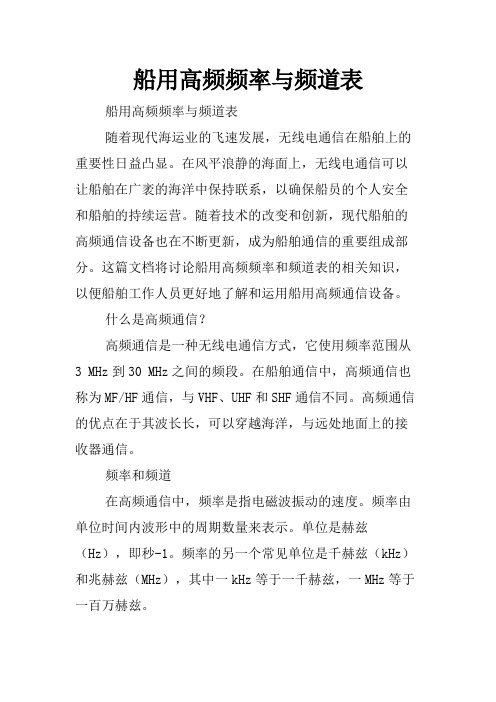
船用高频频率与频道表船用高频频率与频道表随着现代海运业的飞速发展,无线电通信在船舶上的重要性日益凸显。
在风平浪静的海面上,无线电通信可以让船舶在广袤的海洋中保持联系,以确保船员的个人安全和船舶的持续运营。
随着技术的改变和创新,现代船舶的高频通信设备也在不断更新,成为船舶通信的重要组成部分。
这篇文档将讨论船用高频频率和频道表的相关知识,以便船舶工作人员更好地了解和运用船用高频通信设备。
什么是高频通信?高频通信是一种无线电通信方式,它使用频率范围从3 MHz到30 MHz之间的频段。
在船舶通信中,高频通信也称为MF/HF通信,与VHF、UHF和SHF通信不同。
高频通信的优点在于其波长长,可以穿越海洋,与远处地面上的接收器通信。
频率和频道在高频通信中,频率是指电磁波振动的速度。
频率由单位时间内波形中的周期数量来表示。
单位是赫兹(Hz),即秒-1。
频率的另一个常见单位是千赫兹(kHz)和兆赫兹(MHz),其中一kHz等于一千赫兹,一MHz等于一百万赫兹。
频道是一组元素,通常由特定频率和与之相关联的通信参数组成。
在船用高频通信中,频道由两部分构成,第一部分是频率,第二部分是模式。
模式是指特定的发射模式和接收模式,以确保成功的通信。
模式包括连续波模式,频率调制模式,幅度调制模式和单边带模式。
船用高频频率和频道表船用高频频率和频道表的目的是确保船员可以使用正确的频率和模式与其他船员、海岸站等地面接收器通信。
因此,船用高频频率和频道表是船舶无线电通信非常重要的一部分。
每个国家都有自己的频率和频道表,中国也是如此。
以下是中国船用高频频率和频道表的详细信息。
中国船用高频频率和频道表(M)在中国,船用高频频率和频道表(M)由中国海事局发布和更新。
以下是当前有效的频率和频道表:ITU通信区带(HF):|ITU带|频率(kHz)| |:-:|:-:| |A3|4125、6215、8291、12290、16420| |F1|2182| |F2|4104、6212、8298、12220、16450| |F3|4149、6224、8310、12320、16530| |F4|4131、6218、8304、12242、16472|非ITU通信区带(HF):|频率(kHz)|模式| |:-:|:-:| |4146|USB||6209|USB| |8297|USB| |12353|USB| |16420|USB|中国内马航道:|频道号|频率(kHz)|模式| |:-:|:-:|:-:| |CHINA-A1|2008|USB| |CHINA-A2|2039|USB| |CHINA-A3|2056|USB| |CHINA-A4|2065|USB| |CHINA-A5|2074|USB| |CHINA-A6|2084|USB| |CHINA-A7|2102|USB| |CHINA-A8|2116|USB| |CHINA-A9|2126|USB| |CHINA-A10|2137|USB| |CHINA-A11|2146|USB| |CHINA-A12|2156|USB| |CHINA-A13|2166|USB| |CHINA-A14|2174|USB|总结在船用高频通信中,频率和频道是船员进行通信所必需的基础知识。
- 1、下载文档前请自行甄别文档内容的完整性,平台不提供额外的编辑、内容补充、找答案等附加服务。
- 2、"仅部分预览"的文档,不可在线预览部分如存在完整性等问题,可反馈申请退款(可完整预览的文档不适用该条件!)。
- 3、如文档侵犯您的权益,请联系客服反馈,我们会尽快为您处理(人工客服工作时间:9:00-18:30)。
(This chart is also available in text or Excel versions) VHF Maritime Spectrum Chart
NOAA Weather Radio Frequencies
See the NOAA Weather Radio Homepage for more information.
Additional Information, Frequencies, & Charts
Frequencies are in MHz. Modulation is 16KF3E or 16KG3E.
Note that the letter "A" indicates simplex use of the ship station transmit side of an international duplex channel, and that operations are different than international operations on that channel. Some VHF transceivers are equipped with an "International - U.S." switch for that purpose. "A" channels are generally only used in the United States, and use is normally not recognized or allowed outside the U.S. The letter "B" indicates simplex use of the coast station transmit side of an international duplex channel. The U.S. does not currently use "B" channels for simplex communications in this band.
Boaters should normally use channels listed as Non-Commercial. Channel 16 is used for calling other stations or for distress alerting. Channel 13 should be used to contact a ship when there is danger of collision. All ships of length 20m or greater are required to guard VHF channel 13, in addition to VHF channel 16, when operating within U.S. territorial waters. Users may be fined by the FCC for improper use of these channels. See Marine Radio Watch Requirements for further information. See the Federal Communications Commission's Marine VHF Radio Channels page. The FCC page does not include frequency information, but has more complete information on the use of the channels. If you notice any discrepancy between these two lists, please notify us at .
Also available are International VHF Maritime Radio Channels and Frequencies, Narrowband VHF Maritime Channels and Frequencies, Radio Information for Boaters , and U.S. Coast Guard VHF Distress and Safety Coverage。
